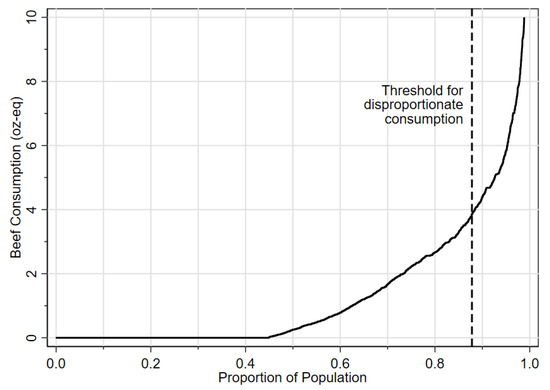177
Demographic and Socioeconomic Correlates of Disproportionate Beef Consumption among US Adults in an Age of Global Warming
www.mdpi.comConcern for the environment when making dietary choices has grown as the contribution of the food sector to global greenhouse gas emissions becomes more widely known. Understanding the correlates of beef eating could assist in the targeting of campaigns to reduce the consumption of high-impact foods. The objective of this study was to identify the demographic, socioeconomic, and behavioral correlates of disproportionate beef consumption in the United States. We analyzed 24-h dietary recall data from adults (n = 10,248) in the 2015–2018 National Health and Nutrition Examination Survey (NHANES). Disproportionate beef consumption was defined as an intake greater than four ounce-equivalents per 2200 kcal. Associations of this indicator variable with gender, age, race/ethnicity, education, family income, diet knowledge, and away-from-home meals were assessed using logistic regression, incorporating survey design and weighting. Disproportionate beef diets were consumed by 12% of individuals, but accounted for half of all beef consumed. Males were more likely than females (p < 0.001) to consume these diets. This relationship was seen in all bivariate and multivariable models. Older adults, college graduates, and those who looked up the MyPlate educational campaign online were less likely (p < 0.01) to consume a disproportionate beef diet. While almost one-third of reported consumption came from cuts of beef (e.g., steak or brisket), six of the top ten beef sources were mixed dishes: burgers, meat mixed dishes, burritos and tacos, frankfurters, soups, and pasta. Efforts to address climate change through diet modification could benefit from targeting campaigns to the highest consumers of beef, as their consumption accounts for half of all beef consumed.



This shit is so fucking stupid
What do you mean? I eat a lot of steak and am unlikely to change that too much, but these are just numbers, and they seem to check out.
The study methods themselves are bogus. They asked people to recall what they ate “last night” and called that indicative of diets.
It’s flawed data without usefulness.
It’s not that the study methods are bogus, but that they don’t actually tell us what the headline says, which, incidentally, is not the title of the study. The actual title of the study is: “Demographic and Socioeconomic Correlates of Disproportionate Beef Consumption among US Adults in an Age of Global Warming”
And from the abstract:
So the study actually does do a good job of that, because 24-hr recall is sufficient to tell us the relative rates of high beef consumption in different population segments.
What it’s not good at differentiating is determining whether it is fewer individuals consuming beef more frequently or a greater number of individuals consuming beef less frequently.
That is to say, 10% of the population consuming >4oz of beef every day compared to 20% of the population consuming >4oz of beef every 2nd day would appear the same. It still does tell us how much beef is being consumed by the population, however, so the data isn’t useless.
I only eat meat and veggies
Pork, beef, duck, chicken, lamb, venison and a lot of broccoli
Because the study methods are ridiculous? Yeah, this is nonsense paraded as data.
Data is garbage